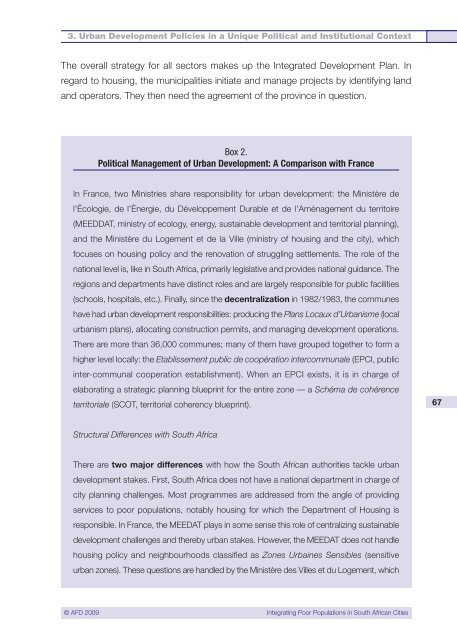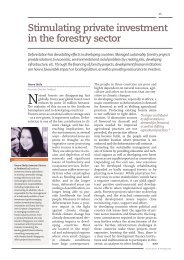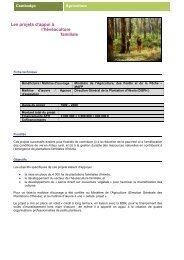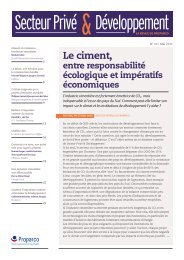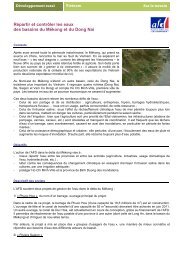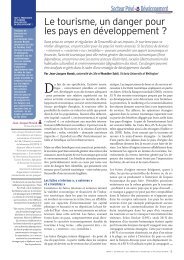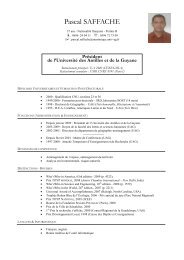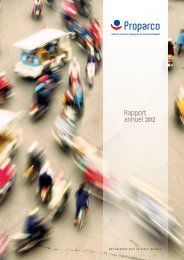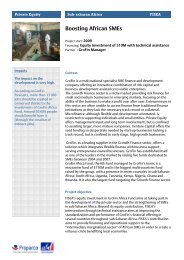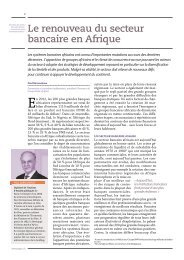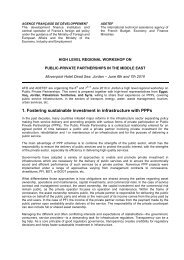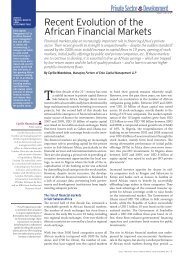Integrating Poor Populations in South African Cities - Agence ...
Integrating Poor Populations in South African Cities - Agence ...
Integrating Poor Populations in South African Cities - Agence ...
Create successful ePaper yourself
Turn your PDF publications into a flip-book with our unique Google optimized e-Paper software.
3. Urban Development Policies <strong>in</strong> a Unique Political and Institutional Context<br />
The overall strategy for all sectors makes up the Integrated Development Plan. In<br />
regard to hous<strong>in</strong>g, the municipalities <strong>in</strong>itiate and manage projects by identify<strong>in</strong>g land<br />
and operators. They then need the agreement of the prov<strong>in</strong>ce <strong>in</strong> question.<br />
Box 2.<br />
Political Management of Urban Development: A Comparison with France<br />
In France, two M<strong>in</strong>istries share responsibility for urban development: the M<strong>in</strong>istère de<br />
l’Écologie, de l’Ènergie, du Développement Durable et de l’Aménagement du territoire<br />
(MEEDDAT, m<strong>in</strong>istry of ecology, energy, susta<strong>in</strong>able development and territorial plann<strong>in</strong>g),<br />
and the M<strong>in</strong>istère du Logement et de la Ville (m<strong>in</strong>istry of hous<strong>in</strong>g and the city), which<br />
focuses on hous<strong>in</strong>g policy and the renovation of struggl<strong>in</strong>g settlements. The role of the<br />
national level is, like <strong>in</strong> <strong>South</strong> Africa, primarily legislative and provides national guidance. The<br />
regions and departments have dist<strong>in</strong>ct roles and are largely responsible for public facilities<br />
(schools, hospitals, etc.). F<strong>in</strong>ally, s<strong>in</strong>ce the decentralization <strong>in</strong> 1982/1983, the communes<br />
have had urban development responsibilities: produc<strong>in</strong>g the Plans Locaux d’Urbanisme (local<br />
urbanism plans), allocat<strong>in</strong>g construction permits, and manag<strong>in</strong>g development operations.<br />
There are more than 36,000 communes; many of them have grouped together to form a<br />
higher level locally: the Etablissement public de coopération <strong>in</strong>tercommunale (EPCI, public<br />
<strong>in</strong>ter-communal cooperation establishment). When an EPCI exists, it is <strong>in</strong> charge of<br />
elaborat<strong>in</strong>g a strategic plann<strong>in</strong>g bluepr<strong>in</strong>t for the entire zone — a Schéma de cohérence<br />
territoriale (SCOT, territorial coherency bluepr<strong>in</strong>t).<br />
67<br />
Structural Differences with <strong>South</strong> Africa<br />
There are two major differences with how the <strong>South</strong> <strong>African</strong> authorities tackle urban<br />
development stakes. First, <strong>South</strong> Africa does not have a national department <strong>in</strong> charge of<br />
city plann<strong>in</strong>g challenges. Most programmes are addressed from the angle of provid<strong>in</strong>g<br />
services to poor populations, notably hous<strong>in</strong>g for which the Department of Hous<strong>in</strong>g is<br />
responsible. In France, the MEEDAT plays <strong>in</strong> some sense this role of centraliz<strong>in</strong>g susta<strong>in</strong>able<br />
development challenges and thereby urban stakes. However, the MEEDAT does not handle<br />
hous<strong>in</strong>g policy and neighbourhoods classified as Zones Urba<strong>in</strong>es Sensibles (sensitive<br />
urban zones). These questions are handled by the M<strong>in</strong>istère des Villes et du Logement, which<br />
© AFD 2009 <strong>Integrat<strong>in</strong>g</strong> <strong>Poor</strong> <strong>Populations</strong> <strong>in</strong> <strong>South</strong> <strong>African</strong> <strong>Cities</strong>


